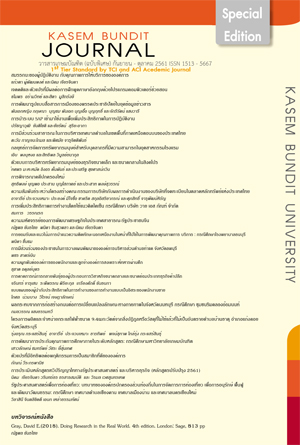Acceptance and Application of Non-technical Skills Concept for Service Quality Development: A Case Study of Thonburi Hospital
Keywords:
Non-technical skills Concept, Concept, Service Quality DevelopmentAbstract
This research aimed to study the acceptance and application of non-technical skills concept for integrated health care service quality development in Thonburi Hospital i.e., human errors, task management, team work and leadership, communications, situation awareness and decision making. Open-ended interview schedules were employed for data collection from health care services quality directors, health care services quality trainers and hospital staff. The study found that most of the research sample accepted non-technical skills concept for integrated health care service quality development and recognized the chance to apply non-technical skills concept for working and daily life.
References
(IRM) The Association of Insurance and Risk Managers (AIRMIC) and The National Forum
for Risk Management in Public sector (ALARM), U.K.
Amorn Sangsuphan,1995, Man Versus Human Factors.The Aviation Medical Institute,
Bangkok, Thailand.
Campbell, RD & Bagshaw, M (eds) 1991, Human Performance and Limitations in Aviation, BSP Professional Books, Oxford, England.
Chompoonuj Saunkratai,2557, Innovation Management (Critical issue), Rompreug Journal,
(October 2556-January 2557), Kreuk University, Bangkok, Thailand.
Craig, PA 2001, Situational Awareness, McGraw-Hill Companies, Inc., U.S.A.
Eaton, J.,2000, Globalization and Human Resource Management in the Airline Industry,
Ashgate Publishing Ltd., England.
ESSAI Consortium,2000, Enhanced Safety through Situation Awareness Integration in
training, WP1 Orientation on Situation Awareness and crisis Management
FAA ,2000, FAA System Safety Handbook, Operational Risk Management; Chapter 15
Garland, DJ; Wise, JA & Hopkin, DV (eds) 1999, Handbook of Aviation Human Factors, Lawrence Erlbaum Associates, London.
G. Fletcher, R. Flin, P. McGeorge, R. Glavin, N. Maran and R. Patey, 2003,
Anaesthetists' Non-Technical Skills (ANTS): evaluation of a behavioural marker
system, British Journal of Anaesthesia 90 (5): 580±8
Hawkins F.H.(1993). Human Factors in Flight, Avebury Technical, England ICAO circular
217.AN/132, copy issue
Huay, B.M. and C.D. Wickens. 1993. Workload transition: Implications for individual and
team performance. Washington, D.C. : National academy press.
Johnston, N; McDonald, N & Fuller, R (eds) 1995, Aviation Psychology in Practice, Ashgate
Publishing Ltd., England.
Kouri. J, 1999, Decision Making, Guernsey Press Co., UK
Nagel D.C.(1988).Human Factors in Aviation, Academic Press, California, U.S.A.
Nith Sammaphan, 2003, Leadership: Drive of Excellent Organization, Thailand Productivity
Institute,Bangkok, Thailand.
O’Hare D.(1999).Human Performance in General Aviation, Ashgate Publishing Ltd., England
Orlady, HW & Orlady, LM (eds) 1999, Human Factors in Multi-Crew Flight Operations,
Ashgate Publishing Ltd.,Cambridge, England.
Panida Chuenchom, 2006, Factors Related to Situation Awareness and Crisis Management
in Aviation, Mahidol University, Bangkok, Thailand.
Panida Chuenchom, 2561, Intregrated Approach Development on Multidisciplinary Service
Quality ,Kasem Bundit University, Bangkok, Thailand.
Pavittra Sondee, 2560. Acceptance Mobile Banking Application Innovation of User Age 40-60
Years old,Bangkok University, Bangkok, Thailand.
Reason, J 1990, Human Error, Press Syndicate of the Cambridge University Press, (Reprinted
1991, 1994), U.S.A.
Smith, D. 2005. Workload management: Navigation & Available : https://www.darrensmith.cfii/mei, January 6, 2006.
THAI Crew Resource Management Manual (CRM), 1999, BZ Dept, Thai Airways International
Public Co.,Ltd, Bangkok, Thailand.
THAI Crew Resource Management Manual (CRM), 2009, BZ Dept, Thai Airways International
Public Co.,Ltd, Bangkok, Thailand.
The Healthcare Accreditation Institute (Public Organization) Manual, 2013, The Healthcare
Accreditation Institute (Public Organization), Bangkok, Thailand.
Thom, T., 1994, The Air Pilot’s Manual: Human Factors and Pilot Performance, Livesey Ltd., Shrewsbury, England.
Trollip, Stanley R and Jensen, Richard S 1991, Homan Factors for General Aviation, Jeppesen Sanderson, U.S.A.
Webster, Russell 2000, Super Communication: the NLP Way, David Grant Publishing Company Limited, U.K.
Wiegmann, D,A. & Shappell,S.A.,2003, A Human Error Approach to Aviation to
Aviation Accident Analysis: The Human Factors Analysis and Classification System,
Ashgate Publishing Ltd., England.
Witthayakorn Chiengkoon, 2004, Manaul of Self Development and Leadership Improvement, Saithan Publishing, Bangkok, Thailand
Worraporn Trakul-sarith,Luth, 2006,Trust:Team Working, https://www.awd_rta.com.
Young, EM 1995, Aerial Nationalism: A History of Aviation in Thailand, Smithsonian Institution Press, U.S.A
Downloads
Published
How to Cite
Issue
Section
License
ทัศนคติ ความคิดเห็นใด ๆ ที่ปรากฏในวารสารเกษมบัณฑิตฉบับนี้เป็นของผู้เขียน โดยเฉพาะ มหาวิทยาลัยเกษมบัณฑิตและบรรณาธิการ ไม่จำเป็นต้องมีความเห็นพ้องด้วย







